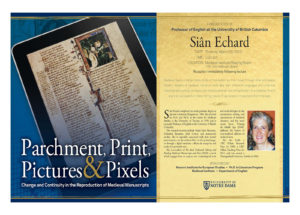From the codex to the Kindle, the printing press to the PC, media have shaped the way in which literature is produced and received. Media have led to new imagined communities and new methods of recording, disseminating, and interpreting texts. As media studies powers into the digital age, it is imperative that we remember and record the “new media” that came before.
Paired with this is a simultaneous movement in literary studies to historicize the text. This theoretical shift leads us to ask the question: are media studies integral to the future of literary studies, and if so, in what direction are these disciplines heading?
This workshop series aims to challenge the perception that “new media” is equivalent to today’s media when, in fact, older media forms were once new. Our goal is to place these older mediums within their historical contexts and ask what the effect these media had on the literature of their day. Some of the questions this series aims to answer are the following:
- How do media imagine and/or create communities?
- How do media shape our literature and environment, our perception of history and/or our processes of thinking?
- How do methods of communication support or subvert the authority of the text?
- How do different media affect reception of the literary text, and how does this affect our perception of the media?
- How do particular media alter the aesthetic qualities of a text?
Contact Us:
Organizers: Hannah Zdansky and Melissa Dinsman
(Ph.D. in Literature Program, University of Notre Dame)
Email: newmedia.workshop.nd@gmail.com
Previous Event:
Guest lecture and graduate seminar by distinguished scholar Dr. Siân Echard on the topic of manuscript/media studies and the digital humanities: “Parchment, Print, Pictures and Pixels: Change and Continuity in the Reproduction of Medieval Manuscripts,” March 29-30, 2012.
